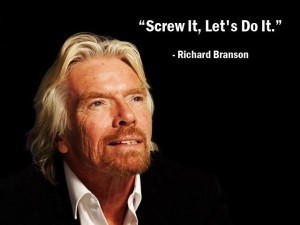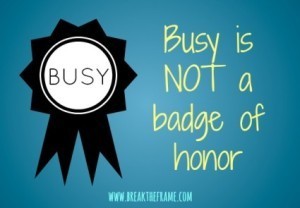Vered Neta's Blog, page 16
December 10, 2013
5 Creativity Myths You MUST Bust
 One of the biggest complaints I hear from struggling entrepreneurs is “you need money in order to have money”. Their biggest excuse for why they are not as successful as they wish to be is that they don’t have the money for it.
One of the biggest complaints I hear from struggling entrepreneurs is “you need money in order to have money”. Their biggest excuse for why they are not as successful as they wish to be is that they don’t have the money for it.
My experience is that money is just an excuse for not focusing on the most important element in your business. I found out that you don’t need money to have money you need… CREATIVITY.
However, most people when they think about creativity they have the wrong assumption what creativity is. Worse, they do not see themselves as creative people.
One of the advantages of living with my partner for 20 years is having the privilege of living with one of the most creative people I’ve met in my life.
He’s the kind of person that would wake up in the morning (lunch time, actually) with 12 new ideas that he would want to implement by evening, but by 4 pm he would have another 20 new and better ideas…
 If you are anything like me this is can be a source of frustration. You see, I used to belong to the club that believed that “I’m not creative”. If you would say to me “BE CREATIVE” I would freeze like a deer caught in headlights.
If you are anything like me this is can be a source of frustration. You see, I used to belong to the club that believed that “I’m not creative”. If you would say to me “BE CREATIVE” I would freeze like a deer caught in headlights.
However, living with my partner I’ve learned the truth about creativity and found out that I was trapped in several myths about creativity that blocked me from being as creative as I am today.
Here are 5 myths about creativity:
 Eureka myth
Eureka myth
Maybe Archimedes got his new idea as a flash of lightning while taking his bath, but research shows that such insights are actually the culminating result of prior hard work on a problem. This thinking is then given time to develop in the subconscious mind. When many of those threads are connect the ideas pop out as new eureka-like innovations.
What it means for you is – don’t expect to get this flash light idea in a one time. You might get it, but it is a result of working on a problem and a topic for some time and checking it from various directions.
 Breed myth
Breed myth
Do you believe that some people are BORN creative and some not? In fact, the evidence supports just the opposite. There is no such thing as a creative breed. They have not found the DNA of creativity.
The truth is that your natural state of being is creative. Just as fish swim and birds fly, human create. If you are willing to have confidence in yourself and work the hard on a problem you are most likely to come up with a creative solution.
Originality myth
Are you afraid to show your creativity, as you fear that someone else would “steal” your idea?
Doing so does not give you the chance to develop the idea and you limit your creativity.
History and research show more evidence that new ideas are actually combinations of older ideas and that sharing those helps generate more innovation.
 Restrictions myth
Restrictions myth
One of my favorite myths is that in order to be creative you need freedom and space and that restrictions would limit your creativity.
Research shows, however, that creativity loves limitations. Actually I found out that the best solutions and the most innovative ideas we had was when we combined several problems together. We used to call it the “Double-Trouble”.
When you have only one problem to solve you tend to look at it in tunnel vision. But when you have more restrictions and more limitation, hence, more problems you HAVE to look in a wider spectrum and then you become creative.
 “THE SECRET” myth
“THE SECRET” myth
Just like “The Secret” movie got people falling into the false belief that in order to create what you want in life; all you need to do is visualize it, too many people believe that once they have the idea the work is done.
However if you want your idea to be successful you will need to use the GOYA rule. You will need to Get Off Your Ass and start working on it. You will need to communicate about it, market it, find the right customers, sell it etc. etc..
Good ideas are not going to change the world unless you DO something with it. We all know many good ideas that stayed only as a plan!
Now I’m curious….
What myth would you need to bust?
Share it with us in the comment box below - what tools you have in becoming more creative?
Let’s support each other in building a strong network of support and share your own wisdom and experience in the comment box below
As a thank-you gift for your comment I will send you a video about ”Mistakes Women Make in Business” from the last seminar of “Women Do Business Differently”
If you find this article inspiring, please SHARE it on Facebook, LinkedIn or retweet it, by pushing the button on the left, for the right channel, so more women could benefit from it.
Please share this article with your:
- LinkedIn connections
and blog readers...
Have a magical week! Vered
December 3, 2013
10 Ways to Have a Successful Mindset
 I always believed that your business would only be big as YOU are as a person. Your business will be able to grow as much as you will.
I always believed that your business would only be big as YOU are as a person. Your business will be able to grow as much as you will.
Once business owners and entrepreneurs get this point they start developing success habits, which include taking care of their health. They start exercising and eating healthy, they develop their physical strength and health.
However, in order to be truly extraordinary and successful you’ll also need to develop your mental strength and develop a healthy mindset.
Business is tough and demanding and you will need to train yourself in the art of what I call “Falling forward”. Meaning that when you fail in something you’ll need to use it as leverage to the next goal and project.
Here are 10 things you can do in order to develop your mental muscles for success:
 1. Stop Feeling Sorry for Yourself
1. Stop Feeling Sorry for Yourself
Stop feeling sorry for yourself when things don’t go right for you. When a situation turns bad for you instead of feeling that the world is against you and that life is “not fair” train yourself to say – “What can I learn from it?” (and make sure you follow up on it) and just simply say… NEXT!
2. Reclaim Your Power
No one can make you feel bad or inferior unless you let them! You are in absolute control over your actions, thoughts and emotions. Learn how to master your emotions and thoughts and work with them in a way that would support you.
3. Start Loving Change
I think one of the reasons both Nisandeh and I are successful is that we hate standing still and when things become “normal”.
I think our biggest fear is not the unknown but that things would become too comfortable and known and we start operating on automatic mode.
Start loving environment that allows you to keep changing and developing all the time and you will develop those mental muscles for success.
 4. Stop Worrying What Other People Would Think
4. Stop Worrying What Other People Would Think
If you wish to be successful you will need to stand out of the crowd. You will need to focus on what is right FOR YOU not about what other people think or if they would like it or not.
You will need to develop those mental muscles that will allow you to navigate situations where people might not like what you do or say. You’ll need to stop trying to please EVERYONE.
 5. Stop Complaining
5. Stop Complaining
You cannot become successful as a victim. Part of being a victim is complaining on stuff that you have no control over, like, traffic, lost luggage and… other people.
When things go wrong recognize that you are the one that is in this situation and just focus on what CAN YOU DO, focus on what solutions can you find for this situation.
6. Take Calculated Risks
In order to grow you will need to take risks. If you keep avoiding them you will miss all the opportunities that are out there. You will need to develop your ability to take calculated risks.
This is different than jumping ahead and taking foolish risks. You’ll need to learn how to weigh benefits and think thoroughly through the process of worst-case scenario versus the benefits and opportunities that you have.
7. Enjoy Other People’s Success
It takes a big person to feel genuinely happy and excited for other people’s successes. You want to develop that ability.
Stop feeling jealous or resentful for what others have achieved, instead look at it as footsteps that have been carved for you; on your path for success.
 8. Learn to “Fail Forward”
8. Learn to “Fail Forward”
Learn the ability to use every failure as a chance to improve. All the successful entrepreneurs I’ve met (or read about) share that 80% of their ideas failed. It takes only 1 good idea to make it a great success.
You want to be able to make as many mistakes as possible in as shortest time as possible to become a success and thus develop your mental strength. Be willing to fail again and again and again, so every “failure” will bring you closer to your ultimate goals.
9. Stop Having an Entitlement Attitude
No one owes you ANYTHING. No one promised you a rose garden when you have a business. Get ready to work hard or even better, work smart and don’t look for short cuts.
 10. Think long-term
10. Think long-term
Whether you are starting a new workout or a new diet, or a business you need to realize that you are in for the long-term. You want to be able to develop the patience to see the results that you wish.
Most people are looking for immediate gratification and therefore want instant results. Extraordinary successful business people have a long breath and are willing to do the work for the long-term and not be discouraged when results are not showing up immediately.
Now I’m curious….
Do you have the mindset of extraordinary successful people?
Share it with us in the comment box below - Are there elements on this list you need more of?
Let’s support each other in building a strong network of support and share your own wisdom and experience in the comment box below
As a thank-you gift for your comment I will send you a video about ”Mistakes Women Make in Business” from the last seminar of “Women Do Business Differently”
If you find this article inspiring, please SHARE it on Facebook, LinkedIn or retweet it, by pushing the button on the left, for the right channel, so more women could benefit from it.
Please share this article with your:
- LinkedIn connections
and blog readers...
Have a magical week! Vered
November 26, 2013
7 Ways to Get Your Partner to Support Your Business
 Business is a challenging adventure. It is also one of the most rewarding adventures when you look at how much it allows you to express yourself and truly fulfill your own potential.
Business is a challenging adventure. It is also one of the most rewarding adventures when you look at how much it allows you to express yourself and truly fulfill your own potential.
It becomes even more rewarding and much more successful when you are able to create an environment that supports you in building this successful business.
When Nisandeh, my partner, and me started Open Circles, all of our teachers and mentors told us – “Don’t work together”. It would never work out to be partners both in life and in business. Business is difficult enough without being involved emotionally as partners in it.
These warnings came from good friends and people that truly cared for us. It all came from the same old common sense belief of “Don’t do business with family”.
 It’s been exactly 20 years ago. Today we celebrate our 20th anniversary and I can honestly say that the decision of working together has been the best decision I’ve made in my life. Nothing has been more rewarding as our life together both as life partners and as business partners.
It’s been exactly 20 years ago. Today we celebrate our 20th anniversary and I can honestly say that the decision of working together has been the best decision I’ve made in my life. Nothing has been more rewarding as our life together both as life partners and as business partners.
At the end of every training we’ll have people coming to either me or Nisandeh asking us: “How do I get my partner to support me in my business, the way you two are doing it?
So today I’d like to share with you some lessons I’ve learned in our 20 years together on how to get your partner’s support in your business.
 1. Your partner is not a mind reader – be clear about what you want and why.
1. Your partner is not a mind reader – be clear about what you want and why.
Very few people are hard-core entrepreneurs, like Nisandeh my partner. Hard-core entrepreneurs are those that never been employees in their lives.
Most of us, like me, have been first an employee and decided at a certain point to take the leap of faith and start this journey called entrepreneurship and building a business. Building a successful business is a challenging journey with ups and downs.
Expecting your spouse or partner to support a half-baked idea based is a sure way to guarantee an awkward and uncomfortable conversation.
I can tell you from my own experience that even though Nisandeh was an entrepreneur all his life, I found out that I get the best support from him to my ideas in business, when my decisions and thoughts are clear on the reasons for WHY I’m doing what I’m doing.
If your decision is based on an emotional irrational response to frustration at work, don’t expect to get a lot of enthusiasm support from your partner to big changes.
Before you share your desire to become your own boss, be clear about what you really want as a result of this major life change. Taking time to reflect on why and when you made this decision creates a better context for him or her to understand where you are and where you want to go.
 2. Think strategically and do your research
2. Think strategically and do your research
It’s not enough to share the vision you have for your business. You will need to do as much research as possible before presenting your idea to your spouse.
In order to be successful in your business you need to think strategically. You better think thoroughly on who is your target audience, what do they need, who are your competitors and WHY what you have to give is better than what there is out there.
In order to know it, you will need to do some research. To gain your partner’s support, develop a plan for success that details the steps you’ll take and the choices you’ll make to provide for your family if things don’t work out.
 3. Think in numbers and look at your potential funding sources
3. Think in numbers and look at your potential funding sources
If you want to get your partner’s support, you always need to put yourself in his or her place. You need to look at the issue from their perspective.
When it comes to business one of the major concerns is the financial side and the effect that it would have on your life styles and living conditions.
If you wish to get their support make sure you put your partner’s mind at ease about how your family’s financial needs will be met. How will you pay for the business? Do you have a plan B? If you can show your spouse that you’ve created a well-thought-out plan, this will go a long way toward calming his or her fears.
If needed consider meeting with a financial planner – having expert advice from a professional shows that you’ve done thorough research.
4. State the benefits
Getting your partner to support you is just like any other sales talk that you would have. You will need to show, explain and demonstrated the benefits of your business and actions to him or her.
Why is your business a good fit for your family? Will it allow your spouse keep their normal way of working or not? If not, talk about these things. Ideally, your business idea will provide other benefits in addition to profitability.
Remember that your name may be on the business card, but you’re not the only person involved in operating the business. Your family’s life will change in order to support your business venture. Ensure that the business is in the best interests of your entire family.
 5. It’s not about YOU!
5. It’s not about YOU!
One of the biggest lessons I got was that it is NEVER personal.
The fact that some of my ideas were met with tough questions and skepticism was not a result of not supporting me on my way to a successful business.
Your partner might be very happy that you are pursuing your passion and building a profitable purpose driven business. His or her questions, as tough as they might be, are just indicators that you have not answered their fears and concerns in a way that is clear for THEM. Answer them in a way that speaks their language. If they are visual, prepare a PowerPoint presentation; if they geek out over “numbers,” use Excel.
In essence, let the numbers do the talking for you — show research that supports why your target market is ideal; show statistics to reveal what the problem is you are solving; show numbers that demonstrate why your ideal client will find your solution attractive; show cash flow and profitability forecasts etc..
 6. Listening is your best technique
6. Listening is your best technique
Addressing your partner’s resistance would be a great way to develop the most important skills you would need in business – listening and asking.
The best way to respect your partner’s fears and concerns is to first hear them out without being defensive.
Remember, this business idea is your dream and it has been on your heart and mind for a long period of time. Therefore, you’ve had a chance to process many of the questions your partner is likely to have.
7. Your partner is just like your future client
After you’ve answered all his questions and listened to what they have to say, consider your partner as if they are your future client and ask a ton of questions until you get to the root of what is at the core of their fear or concern; it is rarely the first – or even – second thing they indicate. Invest the time to get to the core and they will see that you are taking them seriously.
The biggest key here is to not get defensive.
 The second biggest key is – do not get discouraged, even if you have to have multiple conversations. Don’t expect to finish it in one conversation. Don’t put pressure on the relationship by trying to solve it in one sitting or one conversation, be willing to give it the time and to have the patience to have several conversation on the topic.
The second biggest key is – do not get discouraged, even if you have to have multiple conversations. Don’t expect to finish it in one conversation. Don’t put pressure on the relationship by trying to solve it in one sitting or one conversation, be willing to give it the time and to have the patience to have several conversation on the topic.
Realize that the same techniques would be good with your future clients. Your partner, if he or she are resisting are a great way to practice the same tools that you will need in order to turn prospects into clients.
Now I’m curious….
What have you found that helps get support from your partner?
Share it with us in the comment box below - what are your tips in creating supportive environment?
Let’s support each other in building a strong network of support and share your own wisdom and experience in the comment box below
As a thank-you gift for your comment I will send you a video about ”Mistakes Women Make in Business” from the last seminar of “Women Do Business Differently”
If you find this article inspiring, please SHARE it on Facebook, LinkedIn or retweet it, by pushing the button on the left, for the right channel, so more women could benefit from it.
Please share this article with your:
- LinkedIn connections
and blog readers...
Have a magical week! Vered
November 19, 2013
5 Ways to Turn Your Passion into Profits
 If I had a euro for every time I read, or heard, the words “do what you love and the money will follow” I would be a billionaire by now.
If I had a euro for every time I read, or heard, the words “do what you love and the money will follow” I would be a billionaire by now.
I can’t stand those empty words that many people tend to take so literally. It’s not that I disagree with the fact that when you do what you love success, also on financial levels, would show up much faster than when you don’t care.
I do agree that if you hate your work the days look longer and life becomes miserable. Additionally, if you’re trying to get rich doing something you hate, good luck with that. It will likely be tough to stick with it long enough for it to pay off.
However, passion alone does not make a successful business.
It’s painful to see those people that fell into the trap of believing that passion alone will make them successful. In the last 3 years of giving the Business Bootcamp I’ve heard too many heart breaking stories, about businesses that started because someone followed their passion and they thought it would be enough.
 Last week I was talking about finding your passion, but that’s the first step.
Last week I was talking about finding your passion, but that’s the first step.
In order to make your passion into a successful business and have profits (not just income…) you need much more.
If you are one of those that started your business because you followed your passion here is a checklist of what needs to be in your business in order to make it profitable.
If any of the following elements are not in your business, it’s not to put you down, it’s just a point that you’ll need to put attention on and improve it so your business could become profitable.
Here are 5 key elements that you need to have in place in order to turn your passion into a profitable business:
 1. Master your craft before opening your business – It isn’t enough to have talent. Make sure that you are a master in your field. Improve your skills and knowledge constantly. Check how close you are to the 10,000 hour rule.
1. Master your craft before opening your business – It isn’t enough to have talent. Make sure that you are a master in your field. Improve your skills and knowledge constantly. Check how close you are to the 10,000 hour rule.
2. Your business needs to focus on helping people - To turn your passion into profit, you must fulfill a purpose that others need or want. Your business needs to help others. It needs to solve a problem or a desire that they have.
 Unfortunately, people and companies aren’t particularly concerned with whether you follow your passion or not. THEY DON’T CARE ABOUT YOU!
Unfortunately, people and companies aren’t particularly concerned with whether you follow your passion or not. THEY DON’T CARE ABOUT YOU!
They spend money on people, products and services that fulfill THIER needs and desires.
When you focus on your passion – find a way that your passion would fill in a need that your target audience is looking for and cannot find it easily. Make sure that what you give them impact their lives.
3. Identify a specific segment of the market you wish to serve – ABC of business and marketing is – identify your target audience. Identify who are the people that would most likely buy from you and you wish to serve and that .
 4. Passion alone is not enough – you need management and business skills – Having passion, or even being an expert in your field is not enough. Business is an art and science that needs to be learned. You need to have some business skills (not MBA titles) and management skills in order for your business to thrive.
4. Passion alone is not enough – you need management and business skills – Having passion, or even being an expert in your field is not enough. Business is an art and science that needs to be learned. You need to have some business skills (not MBA titles) and management skills in order for your business to thrive.
The Women Do Business Differently seminar was designed exactly for that reason. To give women entrepreneurs the skills and knowledge they need in order to turn their passion into profits.
 5. Persistence is the key – Too many people quit too soon, just because when it become too hard they have the excuse, “well I have so many other ideas and other passions, I’ll follow them…”. Nothing is going to change if you keep this pattern, because the same obstacles will arise in the next passion you will pursue.
5. Persistence is the key – Too many people quit too soon, just because when it become too hard they have the excuse, “well I have so many other ideas and other passions, I’ll follow them…”. Nothing is going to change if you keep this pattern, because the same obstacles will arise in the next passion you will pursue.
The key to success is persistence. You will hear “no,” a lot, but that doesn’t mean you stop your efforts of educating potential clients, investors supplier etc. You need to keep on asking, asking and asking for what you want and need.
You need to keep on going despite critics and people who discourage you. You need to TRUST enough yourself that you can make it into a success.
Now I’m curious….
What elements would you need to master in order to turn your passion into profits?
Share it with us in the comment box below - what are your tips in turning passion into profits?
As a thank-you gift for adding your comment I will send you a video about ”Mistakes Women Make in Business” from the last seminar of “Women Do Business Differently”
If you find this article inspiring, please SHARE it on Facebook, LinkedIn or retweet it, by pushing the button on the left, for the right channel, so more women could benefit from it.
Please share this article with your:
- LinkedIn connections
and blog readers...
Have a magical week! Vered
November 12, 2013
7 Reasons Why You Didn’t Find Your Passion
 Unless you were living under a rock for the past 10 years, you didn’t hear the latest buzzword (maybe not the latest), which is, find your passion and turn it to business.
Unless you were living under a rock for the past 10 years, you didn’t hear the latest buzzword (maybe not the latest), which is, find your passion and turn it to business.
I’ve been blessed to know what is my passion from an early age.
If you are like me, and you have known what is your passion for a long time, you might recognize this amazed look on your face when people ask you – “How did you find your passion?” or “what did you do in order to find your passion” or the toughest one “How do you know that it is your passion?”
You see, when something comes naturally and easy for you, you start taking for granted that EVERYONE else thinks that way or has this skill. You then cannot be compassionate with those that di not have the same ability as you do.
If I would have a cent for each time someone asked me how I found my passion, I would probably have been a millionaire faster than I did.
However, no matter how many times I’ve given people the advice on how to find their passion, some of them still came back to me and say – “This didn’t help me, it got me even more confused and frustrated”
I realized that some people would find their passion easier than others, while others would struggle with it for years.
If you are still struggling or doubting about your passion, here are 7 reasons why you didn’t find your passion until today:
 1. Finding your passion is not a mind problem
1. Finding your passion is not a mind problem
Most articles about finding your passion would suggest you would ask yourself some questions. However, constantly asking yourself “What am I passionate about?” usually has very little benefit.
You can’t find your passion by analyzing your mind. Passion is about DOING. It’s not about THINKING. Rodin’s statue of the Thinking Man is not a symbol of passion. Rodin sculpturing the statue is about passion.
2. Passion is not a feeling it is an experience.
Passion is a result of experiences and actions. Just think of love making. IT’s not about thinking about it it’s the doing… isn’t it??
If you’re looking to feel passionate about something before doing it, then you’re going to be looking for a long time. The feeling of passion will come after you’ve had an experience, not before.
3. Opportunity Knocks? pursue it.
Having a long-term goal is good, but don’t let it blind you from the opportunities that would arise on the journey of reaching that goal.
Instead of becoming obsessively focused on one area, take advantage of the new opportunities that arise from time to time.
You might find your passion by pursuing something completely different than your goal.
 4. Finding your passion is like shopping for shoes
4. Finding your passion is like shopping for shoes
If you think that once you know what your passion is, life becomes clear and without confusion and hard work, you are in for a BIG surprise.
Life is a series of confusing situations and you’ll never have all of the answers. Regardless of the situation, we have to make the best choice at the time and continue to move forward.
Finding your passion is like shopping for shoes. You need to go out and try them in order to see whether it fits you or not.
It isn’t about knowing the right direction from the start. It’s about choosing a direction, paying attention to what interests you along the way, and pursuing those interesting areas further.
 5. Birds fly, fish swim and human create
5. Birds fly, fish swim and human create
Our nature as human beings is to create. Passion comes when you create something. If you are still just searching you are not creating and therefore will not be able to find your passion.
The act of creating is important because it allows you to discover things about yourself.
It is only through the act of pushing yourself and creating something new that you discover what is important to you, what you are good at, and what you are willing to sacrifice for.
 6. Passion is not a destination it is a journey
6. Passion is not a destination it is a journey
Searching for your passion is part of a larger goal — fulfilling your potential.
The problem is that this will demand you to focus on each moment.
Discovering your passion might happen in a series of small steps. You first hear about it in a book or from a friend. Then you go to a class or an event. Then you try it out yourself. Then you try it again. Then it becomes a hobby. Then you’re telling your friends about it. And before you know it, you’ve found your calling in life.
But it didn’t happen overnight. If you gather enough enjoyable moments in your life you will end up living a passionate life.
7. You need to have a compelling WHY
Having interests is not enough. You need to have a specific goal you wish to achieve and have a strong WHY you want to achieve it.
Reaching for a goal is important because it starts a process that brings about opportunities that you cannot predict. If you endeavor to reach a meaningful goal, then there will undoubtedly be opportunities that arise along the way that you would never have imagined when you started.
Whether or not you reach your original goal isn’t nearly as important as the journey it takes you on and the opportunities that journey offers.
Once you have a strong compelling WHY for achieving that goal you’ll find that your passion has a funny way of showing up.
Now I’m curious….
What is your passion and how did you find it?
Share it with us in the comment box below - what are your tips in finding your passion?
If you find this article inspiring, please SHARE it on Facebook, LinkedIn or retweet it, by pushing the button on the left, for the right channel, so more women could benefit from it.
Please share this article with your:
- LinkedIn connections
and blog readers...
Have a magical week! Vered
November 5, 2013
7 Ways to Turn Strangers into Friends
 In the New Economy the 3 steps of getting more clients is getting people to KNOW you, LIKE
In the New Economy the 3 steps of getting more clients is getting people to KNOW you, LIKE
you and then TRUST you.
That means you need to learn the art of turning strangers into friends
However, most entrepreneurs, tend to think that giving business cards to people, means people would know them and it would do the trick.
Newsflash… it doesn’t work that way!
People would throw your business cards (or file them in a place they will never remember where it is), they will forget your name and even your service that you once gave, even if it was a GREAT one.
In order to convert prospects into loyal clients you will need to do constant work of reminding your prospects about your products and services AND remind your existing and previous clients about how you can help them and solve their problems.
In a nutshell YOU NEED TO STAY IN TOUCH
Although this is basic and elementary so many women tend to look at it as if it would be disturbing their prospects, or annoying their clients if they would constantly contact them.
 HALLLOOOO!!! – Think about your best friend. How did she become your best friend?
HALLLOOOO!!! – Think about your best friend. How did she become your best friend?
You kept in touch with her.
You called her, you wrote to her, you spend time with her (more than just one time vacation….)
The same goes with your prospects and clients. Remember – your job is to turn strangers into friends – so the same techniques that worked with your best friend could work with your clients.
It’s only your lack of confidence and the fear of rejection (which does not exist) prevents you from doing it
Here are 7 ways to stay in touch with prospects and clients
 1. Be their weekly newspaper
1. Be their weekly newspaper
There were times when people would wake up in the morning and the newspaper would be their first thing they would read. Today Internet replaced it. Become that weekly paper that your clients would look forward to read. It is called a newsletter (TIP – don’t call it a newsletter, call it anything else BUT a newsletter so they would value it more).
A regular newsletter is the easiest and most effective way to stay in touch with your clients and keep you at the top of their mind.
To make sure that they would look forward to it make sure you give them a LOT of VALUE in your newsletter. The way to do it is by sending them to a longer article or video on your Blog.
 2. Use social media
2. Use social media
The buzzword today is Social Media. Use it wisely.
Share interesting pieces so they can get to know you and your business better.
The idea is that you will connect with your prospects and clients through the sites that they tend to go mostly to (my recommendation start with Facebook, Twitter and LinkedIn) and from there send them to your Blog.
Also comment, share and engage in conversations on the profiles of current and previous clients. This shows that you are taking an interest in them even after they’re not paying clients anymore.
3. “I thought of you” email
Send current and past clients an occasional email with a link and or an attachment of something you know they will find helpful.
This can be a report you wrote or something you found on the internet. It can be a a resource guide (articles and books) you think they might enjoy or details of an event or speaker.
Sending them valuable info even after they’ve worked with you shows you still understand their unique needs and keeps the relationship warm for possible follow up work.
4. Come and meet me
The best way people can get to know you is when they… meet you! The most powerful way to connect is in REAL life. Therefore create events where people can get to know you and meet with you.
These events can be ones that you organize and host or other people’s events. Invite your best clients to them. This way they will not only benefit from the content and networking opportunities, they’ll also hear you speak and experience your expertise in person.
 5. I love birthdays
5. I love birthdays
Everybody loves it when people remember their birthday.
So send your prospects, clients and previous clients a note on their birthday. It doesn’t really have to be a formal or handwritten card (although those always give a nice touch). It can just be a sincere email or even a comment on their Facebook page to let them know you are thinking about them.
6. Snail mail still works great
Be original – people think that due to emails the old post and snail mail is not efficient. SURPRISE your clients and prospects by doing the opposite from what others are doing – send them something in the mail.
I know that it might be costly, so then choose who would be the best target group from your prospects to send it to. It could be your best clients, or those that you have not seen for a while.
 7. I just called to say…
7. I just called to say…
Give your clients and prospects a friendly, no-sales call and ask how they are. They’ll be blown away by this.
A phone call can also be a great strategy to follow up with prospects when you do not hear anything from them after sending out an invitation to work with you.
A simple phone conversation can lead to many new clients since it’s personal and it’s a lot easier to solve issues and answer questions when talking to someone than trying to do it via emails.
Now I’m curious…
What techniques have you found that worked for you to stay in touch with your audience?
Share with us in the comment box below which of those techniques can you benefit from if you add to your marketing?
As a thank-you gift for adding your comment I will send you my video course of “Mistakes Women Make With Money”
If you find this article inspiring, please SHARE it on Facebook, LinkedIn or retweet it, by pushing the button on the left, for the right channel, so more women could benefit from it.
Please share this article with your:
- LinkedIn connections
and blog readers...
Have a magical week! Vered
October 29, 2013
Success is Easy… When You Know HOW
 I received many requests following last week blog post about what successful people DON’T DO to follow it up with what do they DO.
I received many requests following last week blog post about what successful people DON’T DO to follow it up with what do they DO.
I believe success is easy… when you know HOW. I believe that success leaves footprints if you look at those people that are successful in your opinion. If you follow them, and I don’t mean stalking them, but learning from them what they did, how they think, what was their mindset, you will be able to create similar success in your life, if not bigger.
Success is easy… when you have role models that you can learn from. They would show you the way. You would still have to walk it, but it would be easier as they have already created the path for you. This is why role models are so important.
So let’s have a look at some of those successful people and see what can you learn from them.
 1. Solve a Problem
1. Solve a Problem
The definition of an entrepreneur is “someone who solves a problem for a profit”.
Peter Guber, former CEO of Sony Pictures Entertainment, was in his mid-twenties as a new hire at Columbia Pictures when he realized that the way the studio heads were selecting directors was based on an old mode of thinking instead of real data.
He then decided to find a solution for this old problem. His solution was so simple that very fast it created a buzz that everyone was talking about it.
All he did was get a corkboard and create a matrix where on one side he wrote down all the directors in Hollywood and next to it horizontally all the relevant information about them. You need to remember, that was before the days of Google and Wikipedia…
Guber says that his motto is: “You are in the ‘problem solving’ business—always. That’s the way it works.” This was a key trait that allowed Guber to go from being a new hire at Columbia pictures to the studio chief—in just three years.
What problems do you solve with your product or services? What opportunities can you create to add value to the people that you help? This mindset would bring you faster and closer to the success you are looking for.
 2. Focus
2. Focus
One of the main problems entrepreneurs and business owners have is having too many ideas, too many projects that they love to do, too many directions to follow and certainly too much interruptions and distractions from the outside world.
In order to be successful you need to choose and focus on one thing at a time and get that working.
J.K. Rowling didn’t have an easy time getting the first Harry Potter book published.
One publisher advised her to get a day job, because she had little chance of making a living as an author.
Instead of taking this advice and letting a day job sidetrack her efforts, she stuck with what she really felt was important. She focused on that ONE project that was her passion and she believed in.
 3. Do Whatever it Takes
3. Do Whatever it Takes
Most people would like to be successful. However, not many would be willing to do whatever it takes to reach that success they dream about. Most people prefer being comfortable than being successful.
Sugar Ray Leonard who was a six-time world champion boxer knows what it means to do whatever it takes. He shares that as a child when all his friends and siblings would step up to the schools bus and go to school, he would run behind the bus all the way to school.
“The other kids thought I was crazy,” Leonard says, “because I would run in the rain, snow—it didn’t matter. I did it because I didn’t just want to be better than the next guy, I wanted to be better than all the guys.”
Sugar Ray Leonard did whatever it took even when others thought it was irrational. At the end it turns out irrational commitment leads to irrational success.
Are you doing whatever it takes to get to your success?
 4. Don’t Follow the Herd
4. Don’t Follow the Herd
If you were following me for a while you probably know by now that I am a big believer of not following the herd and using UN-Common sense in business.
One of my heroes is Tim Ferris, who is a great example of doing it in the UN-Common sense. In his early twenties, Tim Ferriss, bestselling author of The 4-Hour Workweek, was running an online sports nutrition company and realized that he would be risking his businesses’ survival if he followed the industry standard of accepting payment up to twelve months after the product was shipped.
“Everyone followed those rules,” Ferriss says. “I realized I was inviting disaster and financial ruins if I risked my cash flow that way by following the standard protocol, so I insisted on prepayment.
Ask yourself what rules in your industry you accept as fact. Why do you follow them?
 5. Turn Strangers into Friends
5. Turn Strangers into Friends
At the end of the day in order for you to become successful in your business you’ll need to follow the cycle of marketing. Turning strangers into friends. Turning friends into clients and turning clients into ambassadors.
The first step is turning strangers into friends. No one did it better than Steven Spielberg. “Steve knew at that early age that filmmaking is not just filming—it’s a people game. And he played it well,” said producer William Link.
He would directly approach directors and Hollywood stars on the studio lot and ask them to lunch. And keep in mind—Spielberg was only nineteen years old at the time.
While he definitely had talent on his side, so did handfuls of other aspiring directors. What helped Spielberg become the youngest director signed to a long-term studio deal was his focus on building relationships. This has nothing to do with “networking”; this has to do with making friends and focusing on people.
Now I’m curious….
 Which of those points would you implement in your business to make it more successful?
Which of those points would you implement in your business to make it more successful?
Share it with us in the comment box below – what steps would you take to make your business grow?
Those that would share with us their steps will get from me a gift… an Audio program to reprogram your mind to success
If you find this article inspiring, please SHARE it on Facebook, LinkedIn or retweet it, by pushing the button on the left, for the right channel, so more women could benefit from it.
Please share this article with your:
- LinkedIn connections
and blog readers...
Have a magical week! Vered
October 22, 2013
Success Habit – Stay in Line
 They say that 80% of success is just… showing up.
They say that 80% of success is just… showing up.
What it means is that if you wish to be successful, in any area of your life you first have to show up at that area. You need to do what we call in the Business Bootcamp: “Get in line”.
There are many articles about the success habit that successful people have. However, sometimes it’s more important to know what successful people DON’T DO in order to be successful.
You see success can come in different formats. You can be successful at your job, or in your business, or at making money. But you can also be successful in your marriage or at sports or in a hobby or even as a parent or in relationships.
Whatever successes you are after there is one thing all successful people have in common, which is the other part of the sentence we use, they all “stay in line”. Not only they show up and get in line, they stay in line whatever it takes.
 People tend to paint the picture of creating success as if it is something that happens overnight or that it is a constant going up the hill towards that goal of success. However, the truth is that many of those successful people in business, entertainment and sport have failed. Many have failed numerous times but they all stayed in line, they never gave up.
People tend to paint the picture of creating success as if it is something that happens overnight or that it is a constant going up the hill towards that goal of success. However, the truth is that many of those successful people in business, entertainment and sport have failed. Many have failed numerous times but they all stayed in line, they never gave up.
Successful people are able to pick themselves up, dust themselves off and carry on trying.
They prove how true the old saying is – “It’s not how many times you fall off the horse, but how many times you get back on it, that would determine your success”.
Successful people all get up one time more than what they fall. That’s what makes them successful.
“Staying in line” demands from you determination, positive outlook at life an endless optimism. Those qualities are the basis of any successful entrepreneur. It’s one of the main differences between the mindset of employees and entrepreneurs.
 I believe there are no failures. Failures are just results different from your expectations. Therefore if you wish to fulfill your expectations you just need to do things differently in order to reach them.
I believe there are no failures. Failures are just results different from your expectations. Therefore if you wish to fulfill your expectations you just need to do things differently in order to reach them.
When you get a result that is different from your expectations learn what didn’t work and improve on it the next time. That way what is so called failure is propelling you forward towards your success.
Here are a few examples of famous successful people and how they used their results (which were different than their expectations) to push them forward towards their success.
 Henry Ford - the pioneer of modern business entrepreneurs and the founder of the Ford Motor Company failed a number of times on his route to success.
Henry Ford - the pioneer of modern business entrepreneurs and the founder of the Ford Motor Company failed a number of times on his route to success.
His first venture to build a motorcar got dissolved a year and a half after it was started because the stockholders lost confidence in Henry Ford.
Ford was able to gather enough capital to start again but a year later pressure from the financiers forced him out of the company again. Despite the fact that the entire motor industry had lost faith in him he managed to find another investor to start the Ford Motor Company – and the rest is history.
 Walt Disney - one of the greatest business leaders who created the global Disney empire of film studios, theme parks and consumer products didn’t start off successful.
Walt Disney - one of the greatest business leaders who created the global Disney empire of film studios, theme parks and consumer products didn’t start off successful.
Before the great success came a number of failures took place. Believe it or not, Walt was fired from an early job at the Kansas City Star Newspaper because he was not creative enough!
In 1922 he started his first company called Laugh-O-Gram. The Kansas based business would produce cartoons and short advertising films.
In 1923, the business went bankrupt.
Walt didn’t give up, he stayed in line and he packed up, went to Hollywood and started The Walt Disney Company.
 Richard Branson - He is undoubtedly a successful entrepreneur with many successful ventures to his name including Virgin Atlantic, Virgin Music and Virgin Active.
Richard Branson - He is undoubtedly a successful entrepreneur with many successful ventures to his name including Virgin Atlantic, Virgin Music and Virgin Active.
However, when he was 16 he dropped out of school to start a student magazine that didn’t do as well as he hoped.
He then set up a mail-order record business, which did so well that he opened his own record shop called Virgin.
Along the way to success came many other failed ventures including Virgin Cola, Virgin Vodka, Virgin Clothes, Virgin Vie, Virgin cards, etc.
 Oprah Winfrey - who ranks No 1 in the Forbes celebrity list and is recognized as the queen of entertainment based on an amazing career as iconic talk show host, media proprietor, actress and producer.
Oprah Winfrey - who ranks No 1 in the Forbes celebrity list and is recognized as the queen of entertainment based on an amazing career as iconic talk show host, media proprietor, actress and producer.
In her earlier career she had numerous set-backs, which included getting fired from her job as a reporter because she was ‘unfit for television’, getting fired as co-anchor for the 6 O’clock weekday news on WJZ-TV and being demoted to morning TV.
This year in her commencement speech in Harvard she was sharing how still today even after all these years as a No. 1 media mogul, she felt that she failed because her own TV channel was not doing as well as her expectations. But… she got up, stayed in line and today her shows are just as successful as she had them before.
 J.K. Rowling - who wrote the Harry Potter books selling over 400 million copies and making it one of the most successful and lucrative book and film series ever.
J.K. Rowling - who wrote the Harry Potter books selling over 400 million copies and making it one of the most successful and lucrative book and film series ever.
However, like so many writers she received endless rejections from publishers. Many rejected her manuscript outright for reasons like ‘it was far too long for a children’s book’ or because ‘children books never make any money’.
J.K. Rowling’s story is one of my favorites as she was a single mom on welfare when writing those books. Just to prove that there is always a way when you are committed. She used to sit and write in small coffee place next to her apartment as it was warmer there than in her apartment.
So, the one thing successful people never do is: Give up!
I hope you remember it – Get in line and… Stay in line – that is what would make the difference in your success.
Now it’s your turn…
Are there other things you would add to the list of things successful people never do?
Share with us in the comment box below your experience, ideas of what successful people NEVER DO
If you find this article inspiring, please SHARE it on Facebook, LinkedIn or retweet it, by pushing the button on the left, for the right channel, so more women could benefit from it.
Please share this article with your:
- LinkedIn connections
and blog readers...
Have a magical week! Vered
October 15, 2013
Are you guilty of being “Ms. Busy-Important”?
 Are you constantly on the go, juggling your business, partner, kids, friends, and volunteering? Are there never enough hours in the day?
Are you constantly on the go, juggling your business, partner, kids, friends, and volunteering? Are there never enough hours in the day?
Does this sound familiar to you? From the moment the alarm clock rings, you’re on the move. Skipping breakfast or wolfing down a granola bar on the way to work, hurrying to put makeup on while waiting in traffic, facing a brimming inbox at eight a.m., frantically looking for those important documents before a meeting… and on it goes.
For many years that was me.
I felt good knowing that I can do all those things and juggle many projects and wear many hats only to find out that this “Ms. Busy-Important” is not getting me closer to my goals and actually not allowing me to enjoy the fullness of life.
If you are still not sure if you are playing that game let me ask you – Have you also had one of those days where you feel like it was a busy and productive day only to realize at 5 o’clock that you checked nothing off your to-do list and instead spent the entire day accomplishing nothing important?
 It’s as if you’ve been doing what I call the “Tango-Dance” work – one step forward two steps backward… Now, instead of being one step ahead, you start the next day two steps behind.
It’s as if you’ve been doing what I call the “Tango-Dance” work – one step forward two steps backward… Now, instead of being one step ahead, you start the next day two steps behind.
If you had those days – you are guilty of playing this game of “Ms. Busy-Important“. This habit of being “Ms. Busy-Important” is one of the most destructive entrepreneurial habits.
When you work that way it looks as IF you are working, but you are not. You are substituting REAL work by doing work that does not lead you towards your goals. Work like – cleaning up your desk, reorganizing your files, and redoing anything, multitasking between the different hats that you are wearing. All this takes you away from your productive time.
When you work under the influence of “Ms. Busy-Important” it requires real effort and real resources, just like real work does. But the result is that at the end of the day you have not done anything substantial and worse… you know it and it feels… SH*T!
 Why do we do it?
Why do we do it?
Almost every time I catch myself falling into this trap of “Ms. Busy-Important” I’m procrastinating, like answering a nasty email, making a call, finishing a blog post I am struggling with for a week or writing a strategic plan…
How do you know whether you are playing “Ms. Busy-Important”?
Anytime you are doing something that doesn’t move your business forward you are playing that game.
The most common ‘criminals’ are administrative tasks, tidying your office, social media engagement and extended meetings or conference calls. All of them are probably necessary but, for one reason or another, turn from productive to destructive.
Take administrative tasks as an example. You have to handle a certain amount of administrative duties, even if you manage to outsource most of them. However each time you decide to do the administrative tasks instead of doing productive work or you tend to spend on it more time than is needed that’s when you are playing that game.
The same goes for social media interaction and extended meetings. Both are necessary components of business, but when your participation turns from strategic to social – they become a huge waste of time (this is what I keep ‘preaching’ whenever I talk about social media in any of our programs).
Want to avoid getting stuck in this role of “Ms. Busy-Important”?
Here are 5 tips that help me, every time:
 1. Set daily goals
1. Set daily goals
It’s one of the best ways to avoid falling into this trap.
Make your daily goals as specific as possible, choosing ONLY 3 to 6 core tasks to do (and finish).
Think of them as concrete deadlines, not as an abstract wish list of things you would maybe like to accomplish.
2. Manage your day by calendar
Make your calendar and task list your time manager, and do exactly what your time manager tells you to do.
That means work in distraction-free time blocks to do your core tasks and once or twice a day block time for reactive work like checking email and social media updates.
3. Know your what makes you fall into the trap
Recognize what types work projects tempt you away from your productive work.
Are you a chronic organizer? Are you hooked on social media? Do you insist on checking e-mail every time you get a new message alert? Do you like to chit-chat after meetings or calls?
4. Understand the temptation
Pay attention to when and why you are tempted to fall into this trap. What is the benefit that you get doing this role.
Often it’s because you are avoiding something else like a task you dislike or afraid of.
Whatever you do, don’t give in. Stick with your productive tasks and reward yourself when they’re done.
5.Handle less important tasks efficiently
Delegate, simplify, automate whatever you can…
So let me ask you again, are you guilty of playing “Ms. Busy-Important”?
And if so, what are you going to do about it to change before it’s too late?
Let’s help each other getting rid of this role…
Share with us in the comment box below your favorite ‘Ms. Busy-Important” activities AND your top ‘REAL work’ activities.
If you find this article inspiring, please SHARE it on Facebook, LinkedIn or retweet it, by pushing the button on the left, for the right channel, so more women could benefit from it.
Please share this article with your:
- LinkedIn connections
and blog readers...
Have a magical week! Vered
October 8, 2013
When Life Offers You Lemons
 A few weeks ago I gave the Breakthrough To Success, our most intensive and powerful training that teaches you how to breakthrough any limitation that you face in your life.
A few weeks ago I gave the Breakthrough To Success, our most intensive and powerful training that teaches you how to breakthrough any limitation that you face in your life.
You were born with immense potential, however during the years we have been conditioned to keep ourselves small and believe in limitations and in impossibilities, even when they do not exist.
If you were honest with yourself you’ll see that many of those things that you hold to believe as impossible, or impossible for YOU, are not really impossible.
 The only reason that you prefer to believe that something is impossible for YOU is your lack of trust in your abilities, or just plain… laziness. It’s much more easy to stay stuck in where you are than going out of your comfort zone and taking a risk. It’s much more easy to blame others or your upbringing, your culture, circumstances, gender or any other excuses that you have for NOT going out and becoming the amazing person that you can be.
The only reason that you prefer to believe that something is impossible for YOU is your lack of trust in your abilities, or just plain… laziness. It’s much more easy to stay stuck in where you are than going out of your comfort zone and taking a risk. It’s much more easy to blame others or your upbringing, your culture, circumstances, gender or any other excuses that you have for NOT going out and becoming the amazing person that you can be.
In the Breakthrough to Success, we show the participants how much more they have in them and how they can go beyond their own stories and excuses and truly create the life they wish for and fulfill their potential.
You see, for better or for worse, we all create our own reality.
That does NOT mean you have absolute control over what life will bring you.
On the contrary you have not control what-so-ever on what life will bring you. What you have absolute control over is HOW you respond to what life brings you.
This is where the difference lies between successful people and struggling people.
Struggling people will always have excuses and stories WHY they are not as happy, successful or rich as they want to be.
Successful people will not let circumstances stand in their way of achieving their dreams. They know that there is always a way when you are committed.
Once you are committed to your own success the question is HOW do you overcome the obstacles life will hand you.
Some people would focus on what it is that they need to change in themselves in order to get where they want to get.
They will spend time, energy and effort in finding ways how to develop new skills and strengthen their strong elements, in order to achieve their goals.
Have a look at this remarkable young woman and see how much she has adjusted herself and developed herself in order to reach her dreams and overcome her obstacles.
Other people would use their skills and find ways to adjust the world so it would fit them.
They would develop different techniques and tools that would support them in reaching their dreams and going beyond their obstacles. They would innovate and create new tools for them to make the world work for them.
Watch this amazing young guy how he does it:
Now I’m curious…
How do you face your obstacles?
Share with us in the comment box below – do you change yourself, or do you change the world around you?
If you find this article inspiring, please SHARE it on Facebook, LinkedIn or retweet it, by pushing the button on the left, for the right channel, so more women could benefit from it.
Please share this article with your:
- LinkedIn connections
and blog readers...
Have a magical week! Vered



